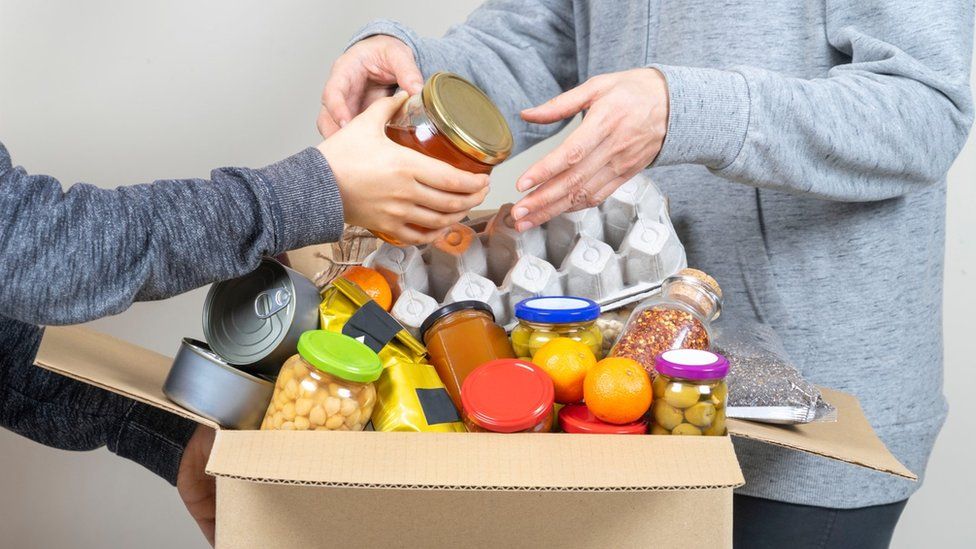ARTICLE AD BOX
 Image source, Getty Images
Image source, Getty Images
The Trussell Trust said before the pandemic all food in its emergency parcels was donated
By Kevin Peachey
Cost of living correspondent
Food banks are having to buy groceries at high prices because donations fail to meet demand from families in need.
The Trussell Trust said 13% of food in emergency parcels was bought, whereas before the pandemic it was all donated.
Donations do not always match their most-needed items meaning charities have to buy more to cover shortages.
But new software may be helping solve this problem, by telling people exactly which groceries and toiletries are running low in their local food bank.
Paul McMurray, from North Shields, has created Donation Genie - a website that displays the items that are most needed at each specific food bank across the UK.
Visitors to the site can enter a postcode or area and it will show the four nearest food banks and which items they are in most need of.
Mr McMurray, a software engineer at Accenture used days offered by his company to do charity work to develop the idea.
"We want to use the simplicity of technology and kindness of people, then join them together to direct the right food to the right people."
That could lead to "less hunger, less waste, and less food poverty", he said.
The need is clear from data in his area. There was a 54% rise in food parcels handed out in the North East of England in 2022-23 compared with the previous year, among a record three million across the country, according to The Trussell Trust - the UK's largest food bank provider.
Nearby, the network of 36 food banks in County Durham and Sunderland provided food to 2,000 people at the start of last year. By this March, that had risen to more than 4,000 with children accounting for more than a third of them.
Food prices rising at their fastest rate for 45 years has "really affected donations", according to Jonathan Conlon, distribution manager for Sunderland and County Durham food banks.
"Month-on-month, donations are decreasing - less food is coming in to the warehouse from the public. At the same time, the number of people using food banks is increasing," he said.
It is the same story at the other end of the country. In Bromley, south east London, the Living Well food bank spent more than £5,000 in April on groceries to give out. Before Covid it ran on donated food alone. Among those who need it now are families with working parents, including one who has three jobs.
Elsewhere, figures from surveys by the Charities Aid Foundation show that financial donations to food banks peaked in the run-up to Christmas, then slumped in February, although there has been some recovery since. Food banks told the charity that donated supplies had been "erratic" at best.
Jonathan Conlon says donors are also stretched as prices have risen
Mr Conlon, from the Durham food banks network, said any donations were welcome but, in general, there was a greater need for toiletries, as well as tinned meat and fish.
People were more likely to drop pasta, cooking sauce and tins of beans in the collection baskets at supermarkets and churches. Evidence of the mismatch was all around him in a warehouse where a team of volunteers were sorting items primarily given by the public.
The solution, he said, was to think more creatively.
Human-centric technology like Donation Genie is one example of that, community spirit is another.
A few miles away in Gateshead, some of the residents of Bensham Court sheltered accommodation are playing bingo. Hot dog sausages and tins of coffee are the prizes, signalling the shift in what may be considered a lucky luxury as prices soar.
One flat at Bensham Court has been converted into am emergency food bank. It is a lifeline for some of the 135 residents, all of whom are aged over 50.
Poonam says neighbours are helping each other through tough times
However, there is such togetherness, that they are planning to top this up with food grown in a new allotment in the grounds of the 1960s tower block.
According to Julie Bray, social prescribing link worker at the local GP practice, such activities are bringing health as well as financial benefits.
"That keeps them away from their GPs, it stops them from taking medication, and is making them resilient again."
Poonam lives here, has struggled financially, but said she had received vital help and support since she moved in, making her feel part of a family - and that, she said, was priceless.
How can I save money on my food shop?
- Look at your cupboards so you know what you have already
- Head to the reduced section first to see if it has anything you need
- Buy things close to their sell-by-date which will be cheaper and use your freezer

 1 year ago
42
1 year ago
42








 English (US) ·
English (US) ·